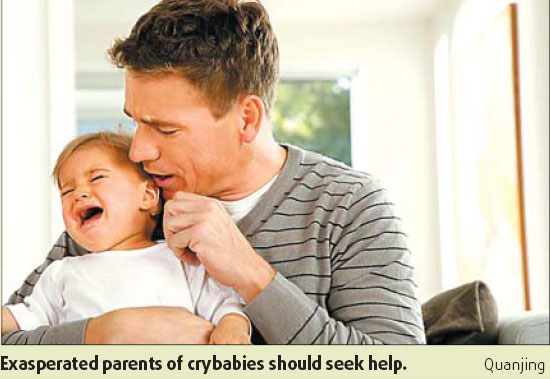Crybabies not parents' fault

HAMBURG: Mia was born and started to cry. All babies do. But Mia did not stop. At three weeks, she cried for eight hours at a stretch, almost without interruption and apparently without cause.
It drove her father, Thomas Bruch, to distraction.
Parents who are at their wit's end because of their infant's constant squalling should seek help. They can find it these days at many children's hospitals and "crybaby clinics".
"If a child cries for at least three hours, on more than three days per week, for at least three weeks, we call it a crybaby," remarks Margret Ziegler, a physician at the Munich Children's Center's "crybaby consultation".
Such children, she says, usually do not calm down easily, are open to stimuli, and have trouble finding their own rhythm.
Peter Hiermann, a crybaby consultation therapist at the University of Leipzig's Children's Hospital, advises against giving crying-prone children too many new stimuli in the first months of life. "Strong stimuli soothe crybabies for a short while only," he notes.
Ziegler says the child should sleep regularly and be awake for periods as brief as possible - an hour and a half at most.
The cause of chronic crying is generally not pain or the famous three-month colic. "You and your pediatrician should determine whether physical or organic causes play a part, of course," advises Evelyn Taplik-Kossak, from Hamburg's crybaby clinic.
A blockage or tenseness could be behind the bawling. A food intolerance or shortage of mother's milk are also possible, Ziegler says. For many crybabies, however, these are not the causes.
Experts agree that stress during pregnancy and depression related to childbirth are especially important factors. In Taplik-Kossak's view, the birth itself plays a key role. A delivery that is too fast or premature "results in stress for the baby," she says.
Finally, the child's temperament matters. "Some children simply have initial difficulties," Hiermann notes.
An infant's constant crying can exhaust the parents and make them feel helpless. In many such families, the situation gradually becomes more and more tense.
"It seems to the parents that the child is screaming at them, and they have the feeling that they're doing everything wrong," Taplik- Kossak says.
As soon as parents start to feel hostile, they should leave the room, Hiermann advises.
Crybaby clinic workers try to restore peace in the family through discussions and relaxation techniques. Mia and her parents improved their relationship after six consultation sessions.
"She's a changed person," Bruch declares, "a completely normal child that sometimes cries and then calms down." He advises all parents of chronic criers to seek assistance. "You're not a failure if you do," he says.
DPA
(China Daily 04/16/2008 page19)














